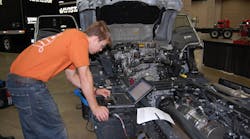Michael Riemer, vice president of product and channel marketing at Decisiv, is no stranger to the complex world of “Big Data” and how it impacts the trucking industry.
His company helps power the “closed-loop” ASIST maintenance service system used by Mack Trucks and Volvo Trucks North America and also just introduced a new “visualization tool” for truck maintenance operations here at the 2017 Technology & Maintenance Council (TMC) annual meeting.
And somehow, in the midst of all of that, Riemer found time to pen a new white paper for Decisiv entitled VMRS: The Next Level to illustrate how transportation and logistics firms can use the vehicle maintenance reporting standards or “VRMS” codes developed by TMC to improve their operations.
“Inconsistent usage, limited adoption and misconceptions have minimized the broader value of VMRS,” he explained during a press conference here in Nashville this week.
“Too many people in the transportation industry think that VMRS is only a nine-digit component code, a practice that only takes advantage of three of the 84 available code keys,” Reimer said. “However, this grossly undervalues the power and value of VMRS as the standard, universal language for service event and asset maintenance.”
Indeed, it would seem a no-brainer that truck manufacturers and their fleet customers should be able to share more detailed diagnostic data in order to maximize vehicle uptime.
But in an interview with Reimer conducted before this week’s TMC convention, he stressed that is not quite as simple as it sounds, especially when warranty claims are involved.
That’s where the need to understand “Big Data” and its relation to maintenance is so vital, Reimer told me. Here are some other insights he shared from our question and answer session:
How is the use of 'big data' and remote diagnostics altering traditional truck maintenance practices?
The use of big data to more proactively understand fault code severity and provide guidance on condition or “usage” based maintenance is a very important part of the overall service and repair strategy across the trucking industry.
However, just telling a fleet that there is a problem or that their asset needs attention is only a piece of the puzzle. In too many situations, this results in an email and/or a phone call but not truly “actionable information.”
We need to take the "intelligence" from their [truck OEM] big data analysis of engine performance and fault codes – especially the severity level of such codes and recommended repair plans – and combine them with business rules on who to contact/alert at the fleet. It’s also about facilitating electronic communication, service scheduling and then end-to-end service event monitoring and updates.
Can “Big Data” really improve vehicle uptime? How does such data allow fleets to improve maintenance?
There is a difference between “big data” and “lots of data.” In many cases, fleets have lots of data, but it is of poor quality and comes well after the fact via hand-entered invoices with poor VMRS coding, paper inspection forms transcribed with errors, limited oversight on external repairs and downtime are just a few of the culprits.However, with better tools, “lots of data” can become useful big data, which can improve decision-making [and] significantly reduce and possibly even eliminate unscheduled service events.
Also, data access is critical both during and after service events. If you rely only on after the fact data capture you miss opportunities to course correct or change the outcome.
For instance, going into a service event with knowledge of fault code severity, recommended repair plans, past performance of your specific service providers – including average downtime – pending operations and maintenance status as well as any OEM recalls and service bulletins arms you with information to make the best decision possible for your fleet and your drivers.
Is the broader availability of data changing the skill sets of maintenance managers and technicians?
Management of service events and the ability to make maintenance a strategic process and a competitive advantage going forward will be more about managing and using information to improve decision making and less about one's knowledge of a how to actually fix a truck.
In other words, fleets who invest in the right people, process and technology for managing service events will see increased asset availability and a lower total cost of ownership. Increasing amounts of truck operational and performance details and the general complexity of trucks will continue to make it hard to find qualified technicians.
In your view, what is the “next frontier” in terms of using “Big Data” to improve truck maintenance?
I believe fleets – except the really big ones – will not have detailed access to the underpinnings of an OEM's truck performance. The number of proprietary sensors and other information captured by OEMs will be a key differentiator for them. This includes both condition-based maintenance and other predictive replacement opportunities.
OEMs are very hesitant to pay a warranty claim on a "working" item unless the OEM was the one that told you to replace it. In other words, they will only trust and support their own algorithms.
The “next frontier” for fleets is to ensure that they have the people, process and technology to take advantage of data from multiple sources and ensure that the information is fully actionable and available in both real-time for improved decision making and after the fact for analytics and reporting.
The more a fleet can understand what data was available and what happened will enable them to have a clearer process for decision making.





